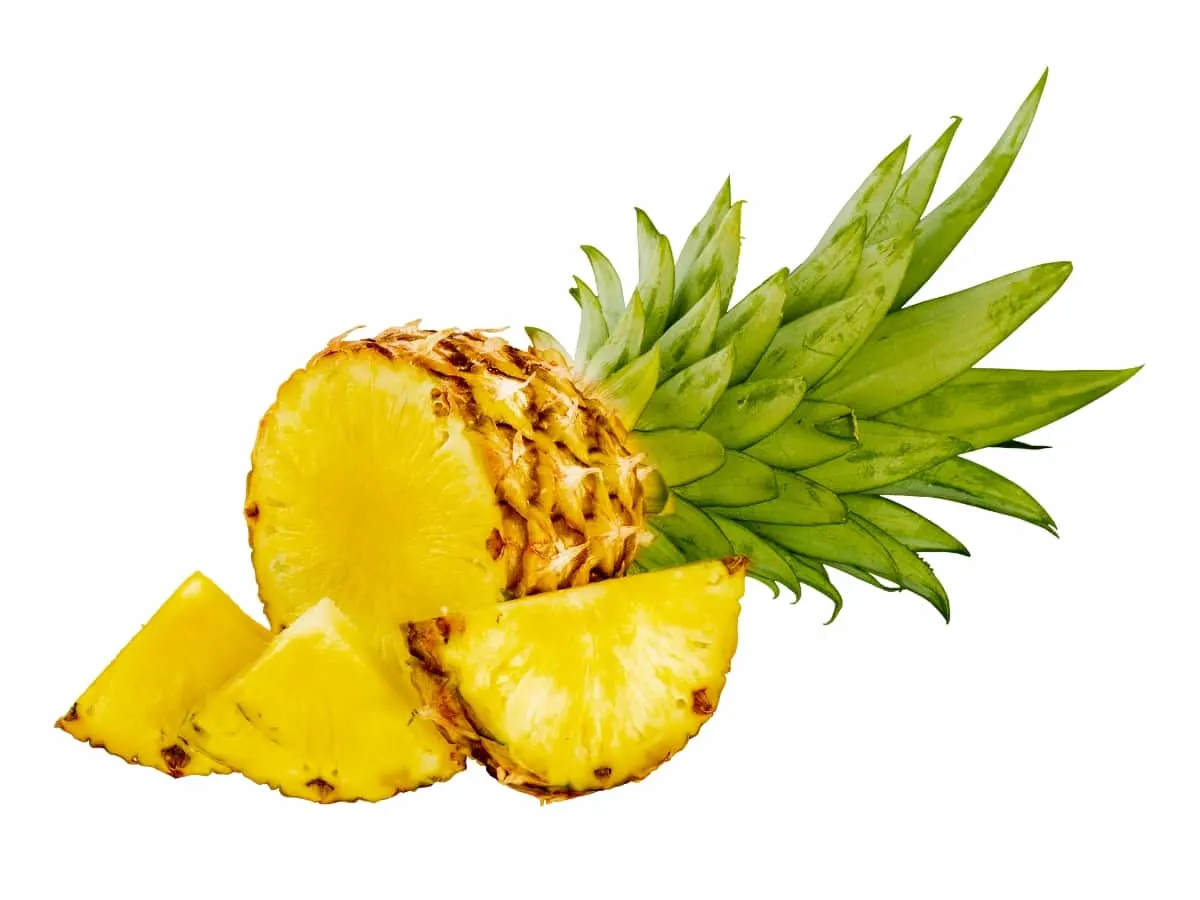As a fellow Labrador owner, I know how vital it is to provide our furry friends with a healthy and balanced diet, including treats! One question that often arises at my dog shelter is whether dogs can eat pineapple. In my experience, I’ve seen some Labs gobble up this tropical fruit with enthusiasm while others have had some adverse reactions. So, can Labradors eat pineapple?
Labradors can eat pineapple but in moderation. Pineapple is a sweet and juicy treat that can provide dogs with vitamins C, B6, and A and dietary fiber, ensuring good digestive health and a robust immune system. However, too much pineapple can cause diarrhea and sugar overload in dogs.
In this blog post, we’ll explore whether your Labrador can eat pineapple and provide some helpful information to decide if it’s a safe and healthy treat for your furry friend. I’ll also tell you exactly how to feed this tangy fruit to your pup.
So, let’s get started!

Can Labradors Eat Pineapple?
Pineapple is good for dogs. It is a safe and nutrient-packed treat and can be a great addition to your dog’s diet, especially if they have skin allergies. This is due to the bromelain it contains, which helps to reduce inflammation.
However, it’s important to share in reasonable portions since pineapples are packed with natural sugar, which could be troublesome for dogs with diabetes or obesity. Always make sure to balance your dog’s diet with the correct nutrients.
Before feeding pineapple to your dog, be sure to remove the hard outer layer and crown. This will make it easier for your dog to digest and reduce the risk of choking.
Health Benefits of Pineapple for Dogs
Pineapple is a delicious and healthy treat that can provide numerous health benefits for your furry friend. This fruit is packed with essential vitamins and minerals that can help support your dog’s immune and digestive system. Here are some of the health benefits of pineapple for dogs:
Vitamins and Minerals
Pineapple is rich in vitamins and minerals that are essential for your dog’s overall health. It contains high levels of vitamin C, which can help boost your dog’s immune system and protect against disease.
It also contains manganese, essential for bone health, and potassium, which can help regulate blood pressure.
Bromelain
Bromelain is present in pineapple. It is a group of enzymes with anti-inflammatory and antimicrobial benefits. Bromelain can be especially helpful for Labs with skin issues, as it can help reduce inflammation and promote healing.
Studies have also shown that bromelain relieves osteoarthritis, diarrhea, and various cardiovascular disorders and has anticancerous properties.
Fiber
Pineapple is a good source of dietary fiber, which can help regulate your dog’s digestive system and promote healthy bowel movements. Fiber can also help your dog feel fuller for longer, which can be helpful for dogs that are prone to overeating.
Hydration
Pineapple is an excellent source of hydration for your dog, especially when served fresh or frozen. This extra juicy fruit can help keep your dog hydrated on hot summer days.

How to Feed Pineapple to Your Labrador
When feeding pineapple to your Lab, you should avoid pineapple juice, dried pineapple, and canned pineapple products as they can be high in concentrated sugar or added sweet syrup and potentially harm your pup’s health.
If you want to share some pineapple with your Retriever, there are a few things to remember.
- Start with small amounts: Introduce pineapple to your dog’s diet slowly and in small amounts. This will help prevent any digestive issues that may arise from a sudden change in diet.
- Choose fresh pineapple: Fresh pineapple is the best option for your dog because it contains fewer additives and preservatives than canned pineapple. Make sure to remove the skin and core before feeding it to your dog.
- Cut the pineapple into small pieces: Cut the pineapple into bite-sized pieces to make it easier for your Labrador to eat.
- Freeze pineapple: On a hot summer day, frozen pineapple sliced into little pieces can be a refreshing treat.
- Puree the pineapple: If your dog has difficulty chewing, you can puree the pineapple in a blender or food processor. Another idea is to freeze it in ice-cube trays.
- Monitor your dog’s reaction: Watch your Lab closely after feeding pineapple for the first time. If they experience any vomiting, diarrhea, or other digestive issues, stop feeding them pineapple and consult with your veterinarian.
By following these tips, you can safely and deliciously incorporate pineapple into your Labrador Retriever’s diet.

How Much Pineapple To Feed Your Dog
I have many dogs of different ages at my shelter. Depending on your dog’s life stage, here’s a table showing the safe quantities of pineapple to feed:
| Life Stage | Safe Quantity of Pineapple |
|---|---|
| Puppy | 1 small chunk per day |
| Adolescent | 1-2 small chunks per day |
| Adult | 2-3 small chunks per day |
| Senior | 1-2 small chunks per day |
***Note that these quantities are general guidelines and may vary depending on your dog’s health, activity level, and dietary needs.
Bear in mind that dogs can’t consume excessive amounts of pineapple. While the dietary fiber in pineapple benefits their digestive health, too much can lead to stomach discomfort.
“You must prevent weight gain and tooth decay by including pineapple as part of your Lab’s balanced diet, and serve it in bite-sized pieces to ensure portion control.”
When offering your dog a pineapple snack, observe their reaction to small portions. Keep an eye on their bowel movements, and look out for vomiting or other signs of upset stomach. If you notice any troubling symptoms, contact your veterinarian.

Potential Allergic Reaction or Sensitivity to Pineapple
While pineapple is generally safe for Labradors to consume in moderation, some dogs may have allergies or sensitivities to the fruit. If you notice any of these symptoms in your dog after consuming pineapple, it’s best to consult your veterinarian.
| Allergic Reaction/Sensitivity | Symptoms | Details |
|---|---|---|
| Oral Allergy Syndrome | Itchy mouth, throat, or ears. Swelling of lips, tongue, or throat. | Some dogs may experience an allergic reaction to the proteins found in pineapple, which can cause oral allergy syndrome. This can result in itching or swelling of the mouth, throat, or ears. In severe cases, it can cause swelling of the lips, tongue, or throat, which can be life-threatening. |
| Digestive Upset | Vomiting, diarrhea, gas, bloating. | Pineapple is a high-fiber fruit that can cause digestive upset in some dogs. This can result in vomiting, diarrhea, gas, or bloating. Dogs with sensitive stomachs may be more prone to these symptoms. |
| Skin Irritation | Itchy skin, hives, redness, rash. | Some dogs may experience skin irritation after consuming pineapple. This can result in itchy skin, hives, redness, or a rash. Dogs with pre-existing skin conditions may be more prone to these symptoms. |
Alternative Safe Fruits for Labradors
There are many other fruits, such as papaya, that can also be beneficial for your dog’s diet. Here are some other alternatives:
- Strawberries
- Apples
- Bananas
- Mangoes
- Cantaloupe
- Raspberries
Read more! Check out my complete list of perfect fruits for Labrador Retrievers.

FAQs
Is pineapple core suitable for Labs?
While pineapple core is not toxic to dogs, it is tough for them to chew or digest. This can cause discomfort and indigestion. So, it is advisable to avoid giving the core to your dog and just provide them with the soft, edible parts of the fruit.
Can Labradors have pineapple juice?
Dogs should not have pineapple juice as it contains high amounts of sugar and often additives and preservatives. Too much sugar can cause a stomach upset and lead to obesity, dental problems, and even diabetes in dogs. Pineapple juice should not replace water in a dog’s diet.
Can dogs eat canned pineapple?
Dogs can eat canned pineapple as long as it is in natural juice and not syrup. Canned pineapple in syrup contains high amounts of sugar, which can harm dogs. Additionally, canned pineapple should only be given to dogs sparingly as it can cause digestive problems such as diarrhea or upset stomach.
Key Takeaways
- Pineapple can be a healthy and tasty treat for Labs, but only in moderation.
- Be sure to remove the hard outer layer and crown before feeding.
- If you want to add pineapple to your dog’s diet, do so as part of a balanced diet.

